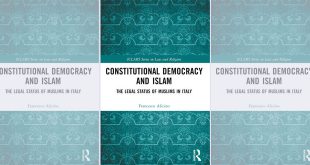This paper draws upon doctrinal research to explore the rise of a new kind of faith–based, unofficial and, privatized forms of matrimonial dispute resolution process(es) emerging within Muslim communities in Britain.
It has been argued that in a multicultural and heterogeneous society there must be a commitment to cultural diversity and pluralism in the area of family life, just as in other areas, and that the law should uphold and support a diversity of family arrangements whether or not they are reflective of differences in race, culture or religion. This paper draws upon doctrinal research to explore the rise of a new kind of faith–based, unofficial and, privatized forms of matrimonial dispute resolution process(es) emerging within Muslim communities in Britain. Framed as sites upon which family law matters are resolved according to the principles of Sharia and Muslim jurisprudence Shariah councils have developed frameworks that are characterized by specific cultural and religious norms and values. This mobilisation of communities challenges the hegemonic power of state law and unsettles the multicultural project in its attempt to reconfigure social and legal discourse in matters of family law. The paper questions how such mechanisms of conflict resolution which have traditionally been defined as non-legal, may co-exist alongside state law in Britain.
Bibliographic Information
Title: Islamic Family Arbitration, Justice and Human Rights in Britain
Author: Samia Bano
Published in: Law, Social Justice & Global Development(An Electronic Law Journal)
Language: English
Length: 26 pages
 Ijtihad Network Being Wise and Faithful Muslim in the Contemporary World
Ijtihad Network Being Wise and Faithful Muslim in the Contemporary World
